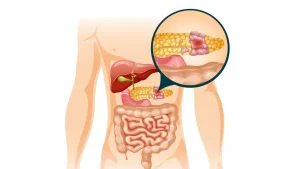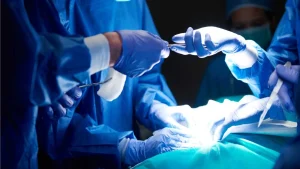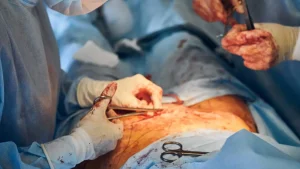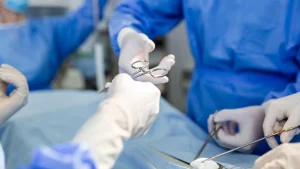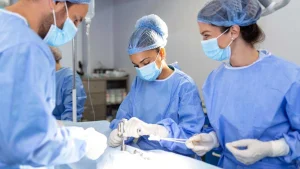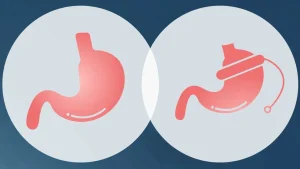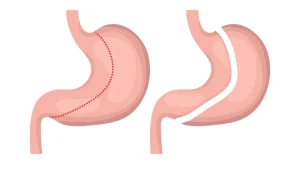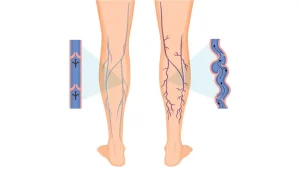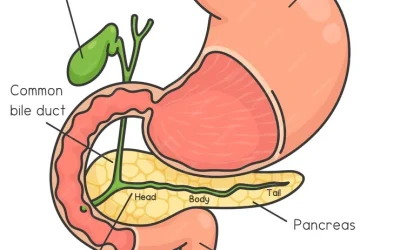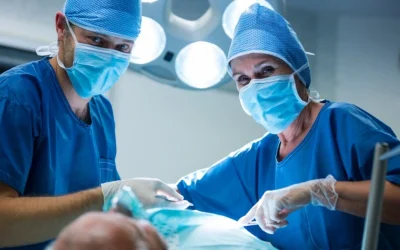Gastric Bypass Surgery

Overview
Are you struggling with obesity and looking for an effective way to lose weight and improve your health? Gastric bypass surgery is a highly effective weight loss surgery that has helped many people achieve their goals and improve their overall quality of life.
Dr Ankit Potdar specializes in gastric bypass surgery and offers personalized care and support to help you achieve your weight loss goals. Here, we’ll take a closer look at gastric bypass surgery, including what it is, how it works, and how it can help you achieve long-term weight loss success.
Everything You Need To Know Gastric Bypass Surgery
What is Gastric Bypass Surgery: Qualifications, Preparation, and Benefits
Gastric bypass surgery is a weight loss procedure that helps individuals who are severely overweight or obese to lose weight by reducing the size of their stomach and rerouting the digestive system. This can lead to significant weight loss, improved overall health, and a higher quality of life.
Qualifications for gastric bypass surgery typically include having a BMI over 40, or having a BMI over 35 with one or more obesity-related health conditions such as diabetes, high blood pressure, or sleep apnea. It is important to discuss your individual situation with your doctor to determine if you are a good candidate for the procedure.
Preparation for gastric bypass surgery may involve making lifestyle changes such as improving your diet and increasing physical activity levels. You may also need to undergo various medical tests and evaluations before the procedure can be scheduled.
Benefits of gastric bypass surgery can include significant weight loss, improved blood sugar control in patients with diabetes, reduced risk of heart disease and other obesity-related health issues, improved mobility and joint pain relief, and an overall improvement in quality of life.
It is important to note that gastric bypass surgery is not a quick fix solution for weight loss and should be viewed as part of a comprehensive plan that includes ongoing dietary changes and regular exercise. Additionally, there are potential risks associated with any surgical procedure which should be discussed with your doctor beforehand.
Understanding Obesity: Causes and Risks
Obesity is a medical condition where an individual has excessive body fat that can have negative health consequences. It is determined by calculating a person’s body mass index (BMI), which is calculated using weight and height measurements. A BMI greater than 30 indicates obesity, with a higher BMI indicating a more severe form of the condition.
The primary cause of obesity is an imbalance between energy consumed through food and drink, and energy expended through physical activity and bodily functions. Factors such as genetics, medications, psychological issues, and environmental factors can influence this balance in some individuals.
Being obese increases your risk of developing various conditions such as type 2 diabetes, heart disease, stroke, high blood pressure, gallbladder disease, certain types of cancer, sleep apnea, and osteoarthritis. Additionally, it can lead to feelings of depression or anxiety due to negative self-image or social stigma associated with the condition.
It is important to talk to your doctor if you think you may be at risk for obesity so they can assess your situation and provide appropriate advice on how to manage your weight safely and effectively.
Preoperative Evaluation
Preoperative evaluation is an important step in the preparation for any surgery. It involves the gathering of information and tests to ensure that patients are in the best possible condition prior to having any procedure. This can include a physical examination, blood work, imaging studies, and other tests based on the patient’s particular medical condition.
The purpose of pre-operative evaluation is to identify any underlying medical issues or conditions that might pose a risk during surgery or lead to health problems afterward. This includes assessing things such as general fitness, heart and lung function, blood clotting ability, kidney and liver function, electrolyte balance, glucose levels, BMI (body mass index), and more.
It is important that patients be honest with their doctor about any past or present medical issues they may have so that these can be taken into account when evaluating their suitability for surgery. Additionally, they should be sure to ask any questions they may have regarding the preoperative evaluation process.
The Procedure
Gastric bypass surgery is a weight loss procedure that can help individuals to reduce their body weight and improve overall health. It involves reducing the size of the stomach and rerouting the digestive system so that food passes through a smaller area. This leads to feeling fuller faster while eating smaller portions of food.
The procedure itself varies depending on the individual’s needs, but generally involves making one or more small incisions in the abdomen, followed by inserting a laparoscope (a tiny camera) into the stomach to view the organs. The surgeon then reduces the size of the stomach by stapling it shut at one end and attaching it to part of the small intestine.
Anesthesia options typically include general anesthesia, where patients are put completely asleep throughout surgery, or regional anesthesia, where they are numbed from chest down while remaining awake. Patients may also receive an intravenous sedative before or during surgery.
As with any major surgery, there are potential risks and complications associated with gastric bypass surgery including bleeding, infections, blood clots, nausea and vomiting, and nutritional deficiencies due to malabsorption of vitamins and minerals.
Post-Operative Recovery
Recovery from gastric bypass surgery is no small matter, but with a commitment to proper post-operative care and lifestyle adjustments, patients will be on their way to reaching their weight loss goals in no time.
Immediately following the procedure, patients may experience moderate pain and tightness in the abdomen as well as nausea from the anesthesia. It is important to follow all of your doctor’s instructions regarding activity levels during recovery; this typically means taking it easy for at least one week after the surgery.
Additional post-operative care usually includes regular follow-up visits with your doctor to monitor your condition and changes in eating habits. Patients should also make sure they are getting enough fluids and vitamins, especially if suffering from any malabsorption issues due to the surgery.
Finally, diet and lifestyle changes are a major part of post-operative recovery. This often includes slowly introducing foods back into your diet while avoiding high fat and sugar items. Additionally, exercise should be incorporated as soon as feasible, starting off slowly with walking then progressing to more strenuous activities as tolerated.
Long-Term Results
Gastric bypass surgery is a major weight loss procedure that can help individuals to achieve long-term success in losing excess body fat. On average, patients can expect to lose about 60% of their excess weight over the first 12 months and maintain this level of weight loss for up to 5 years afterwards. In addition to the physical benefits of weight loss, gastric bypass surgery has also been known to improve overall health outcomes such as reducing risk of heart disease and diabetes, as well as increasing energy levels.
However, it is important to keep in mind that with any major surgery there are potential risks and complications associated with gastric bypass including bleeding, infections, blood clots, nausea and vomiting, and nutritional deficiencies due to malabsorption of vitamins and minerals. It is therefore important to discuss your individual risks with your doctor before undergoing the procedure so you can make an informed decision about whether this type of surgery is right for you.
Frequently Asked Questions about Gastric bypass surgery
-
Who is a good candidate for gastric bypass surgery?
In general, a good candidate for gastric bypass surgery is someone who has been unable to achieve significant and sustained weight loss with conventional diet and exercise methods. The ideal candidate will be at least 18 years old and have a body mass index (BMI) of 40 or more (or 35 or more if the patient has any associated health conditions).
-
How much weight can I expect to lose after gastric bypass surgery?
On average, patients can expect to lose about 60% of their excess weight over the first 12 months and maintain this level of weight loss for up to 5 years afterwards.
-
What are the risks and potential complications of gastric bypass surgery?
As with any major surgery, there are potential risks involved in gastric bypass such as bleeding, infections, blood clots, nausea and vomiting, and nutritional deficiencies due to malabsorption of vitamins and minerals. It is important to discuss your individual risks with your doctor before undergoing the procedure so you can make an informed decision.
-
How long does the procedure take?
Gastric bypass typically takes 2-3 hours when performed laparoscopically. Open procedures tend to take slightly longer.
-
What is the recovery time after gastric bypass surgery?
The recovery period for most patients is about two weeks, although some may require up to four weeks before returning to full activity levels. It is important to follow all of your doctor’s instructions regarding activity levels during recovery; this typically means taking it easy for at least one week after the procedure.
-
Will I have to change my diet after the surgery?
Yes, after your recovery period you will need to make certain dietary adjustments in order to promote healthy eating habits and sustain long-term results from your procedure. This often includes slowly introducing foods back into your diet while avoiding high fat and sugar items. Additionally, intake of fluids should be increased gradually as tolerated by your body.
-
What types of foods will I need to avoid after gastric bypass surgery?
It is advisable that patients avoid processed foods like chips, candy, soft drinks etc., which are usually high in fat or sugar content; opting instead for low calorie meals that focus on lean proteins like fish or chicken, non-starchy vegetables like broccoli or spinach, whole grains like brown rice or quinoa are ideal choices for Gastric Bypass patients. Cutting out sugary drinks (including juice) and avoiding fried food altogether will help ensure healthier eating habits post-surgery.
-
What type of anesthesia will be used during the surgery?
Typically general anesthesia is used during laparoscopic gastric bypass procedures; however depending on each patient’s individual needs your surgeon may choose another type of anesthesia if deemed appropriate.
-
How long will I need to stay in the hospital after gastric bypass surgery?
Most patients are discharged within one day after their procedure depending on how quickly they recover from their procedure as well as their overall medical condition at the time prior to discharge. Patients who require additional observation may remain hospitalized up to 3 days following the surgical intervention
-
Will I need to take any medications after the surgery?
Depending on each case different medications may be prescribed following Gastric Bypass Surgery including pain relief drugs as well as sleeping pills amongst others; it all depends on each patient’s specific condition so it would be best advised that you discuss any concerns related medication prescriptions with your surgeon prior to undergoing this type of treatment option.
-
Can I still become pregnant after gastric bypass surgery?
Yes it is possible for women who have undergone Gastric Bypass Surgery but keep in mind that pregnancy should only occur once you reach a stable weight following several months post surgically intervention since further sudden decreases in weight over short periods can lead to serious health issues during pregnancy.
-
Will I need to attend support groups or counseling sessions post surgically intervention?
It is highly recommended that patients attend follow-up visits/consultations with their bariatric surgeon following placement of Gastric Bypass Surgery as well as joining support groups/counseling sessions where available; these appointments should include periodic assessments both physical & psychological wise.
-
How long will it take to see results post surgically intervention?
Generally speaking post surgically interventions results begin showing within 6 months with optimal results being achieved between 1 year & 3 years thereafter..
-
What is the success rate long term wise?
Long term success rate consisting of maintenance percentage lost bodyweight through single session post surgically treatment averages around 66%-77%.
Why choose Dr Ankit Potdar for gastric bypass surgery?
Dr Ankit Potdar is an experienced and highly qualified bariatric surgeon with 10+ years of experience in the field. He specializes in minimally invasive laparoscopic surgeries that use the latest technologies for improved results, minimal pain and shorter recovery times. His expertise ensures best-in-class patient care before, during and after any procedure by providing one-on-one consultations with his patients and personalized treatment plans.
He has a proven track record of successful gastric bypass surgeries and always keeps up to date with the latest techniques and advancements in bariatric surgery, providing the finest care for his patients. With so much experience under his belt, Dr Ankit Potdar is an ideal choice for anyone considering a gastric bypass procedure.
For more in-depth information, you can contact Dr Potdar and set up an appointment for a detailed consultation about your specific health needs.
Our Services
Pancreatic Cancer
Pancreatic cancer is a type of cancer that affects the pancreas – an organ located in the abdomen
Colon Cancer / Colorectal Cancer Surgery
Colon cancer is a serious and potentially life-threatening disease.
Hernia Laparoscopic Surgery
A hernia is the protrusion of an organ or tissue through a weak or damaged area in the abdominal wall
Piles Surgery
Piles, also known as hemorrhoids, are swollen veins in the anal and rectal area.
Appendix Surgery
Pain or discomfort in your abdomen, it is possible that you may have appendicitis.
Fistula Surgery
A fistula is an abnormal connection between two organs or tissues that can lead to complications.
Gallstone Surgery
Gallstone Surgery is a minimally invasive procedure to remove gallstones.
Gastric Band Surgery
Gastric Band Surgery is a safe, non-invasive bariatric procedure that helps you lose weight quickly and safely
Gastric Bypass Surgery
Gastric Bypass Surgery is a minimally invasive procedure that can help you to achieve your weight loss dreams.
Gastric Sleeve Surgery
Gastric sleeve surgery, an effective and popular procedure for achieving significant weight loss.
Varicose Veins
Varicose veins are enlarged, twisted and swollen veins that occur mainly in the lower legs and feet.

PROFILE
About Dr. Ankit Potdar
Dr. Ankit Potdar is one of the best laparoscopic surgeon in Mumbai, India. He has extensive knowledge and training in advanced laparoscopic and robotic surgery, and is known for his precision, expertise, and compassionate approach to patient care.
He is an expert in general, oncological, advanced laparoscopic GI surgery, Thoracic and Esophageal surgery. He is currently associated with SRV Hospital, Goregaon West and Chembur Mumbai.
He has extensive experience in performing minimally invasive surgeries for various conditions, including gastrointestinal diseases, obesity, hernias, and gallbladder problems.
Patient Treated By Dr. Ankit Potdar
People heavily rely on reviews from other patients when choosing a healthcare provider
Dr. Ankit has done my Brother Harnia Surgery. It went well and my brother recovered so fast. Really good Dr. .Explained every precautions and give full assistance in the follow-up as well.. Thank you Dr. Ankit
Best doctor i ever met. Friendly type nature, my umbilical hernia surgery was done by dr ankit poddar and always recving my calls reply by late nights also ...
Dr Ankit Potdar is a gem of a person. I have been operated for ovarian cancer under his care and we are very satisfied with the treatment received. Doctor is very honest and straightforward and also helped us with the treatment protocol post surgery.
Patient Knowledge Center -Blogs
Blogs
Symptoms of Gallbladder Stones ?
Dr. Ankit Potdar, a renowned gallbladder surgeon in Chembur, specializes in treating gallbladder stones. Learn about symptoms and treatme...
Advantages of Laparoscopic Surgery for Hernia Repair
Transforming Hernia Repair: Meet Dr. Ankit Potdar, Mumbai’s Laparoscopy Expert! Uncover the Benefits of Minimally Invasive Surgery ...
Effective Methods for Gallbladder Stone Relief
Gallbladder stones, also known as gallstones, are a common medical condition affecting millions worldwide. These hardened deposits can ca...

